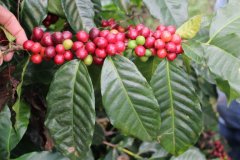Why is black coffee so bitter? why does some people drink it? how to make pure coffee so that it won't be bitter?

Professional coffee knowledge exchange more coffee bean information please follow the coffee workshop (Wechat official account cafe_style)
Bitterness is many people's first impression of coffee, even more bitter than important, causing some people to misunderstand coffee lovers and how to drink so bitterness. In fact, the bitterness of coffee is only one of the flavors. Coffee contains a lot of aroma factors. Only when you understand it do you know that coffee is more than bitter.
The bitterness of coffee
It mainly contains chlorogenic acid and trigonelline. Everyone knows that these two substances are bitter, but they are wronged because they are the main source of good bitterness in coffee, just because bakers do not control them and turn them into another kind of bitter in the process of their generation and transformation. First of all, chlorogenic acid (slightly sour) pyrolysis dehydration, will produce three substances, one is chlorogenic acid lactone (authentic coffee roasting bitter), the other two are caffeic acid (sour) and quinic acid (acid). With the deepening of the degree of baking, these three substances will be transformed into a substance called vinyl catechol (astringent bitter), which is astringent and bitter when it is deep-baked. Most of the bakers I've tasted choose to stop baking when there is the most vinyl catechol, because the state, aroma, visual effects, etc., of the coffee are the best, but not the bitterest. On the other hand, trigonelline is warm and bitter, and baking produces niacin (slightly sour taste).
Brown pigment and melanin-like essence.
This is one of the main sources of coffee bitterness. During the baking process, Mr. Bean becomes a small molecule of brown pigment, and then into a macromolecular melanin-like substance. Small molecules of brown pigment are bitter and appear in shallow baking, when the acid in the coffee exceeds the bitter, so the bitterness is not obvious, dominated by acid. With the deepening of the baking degree, after the small molecular brown pigment becomes melanin-like, the bitterness increases, and at this time the acid content decreases, which becomes the deep-roasted coffee we drink, which is so bitter that it is difficult to swallow and cannot be transformed.
Amino acids produce bitter substances during baking.
For example, sucrose reacts with proline to form aminohexose reducing ketone, which is a very bitter substance. The bitterness produced by this kind of substance is the death bitterness that will not be transformed. Once it is bitter to the end, there is no way to transform it. Only when baking, the baker uses cysteine to do the conversion, not to produce aminohexose reducing ketone, but to produce a kind of furan. Furan substances in coffee are one of the main sources of coffee's good flavor.
Coffee making
First, the first thing that affects the taste of coffee is the variety and origin. Different varieties of coffee beans from different places have different flavors.
Second, the treatment methods of coffee beans: there are common sun treatment and water washing treatment, sun-treated beans taste bitter, sweet, and thick, slightly sour or fruity after a slight drop in temperature, and return to sweet and bitter after chilling; the beans treated with water are sour at the entrance and sweet in the later section.
Third, the roasting method and roasting degree of coffee: different coffees can show the best state under different roasting degrees, which requires bakers to deeply understand the beans in their hands. Generally speaking, roasting in shallow to medium baking can achieve the best results for most hand-brewed coffee, while common ones, such as Starbucks, their beans are extremely deep-roasted, leaving nothing but lifeless bitterness. Generally speaking, only beans that are concentrated in Italian style or of poor quality will be baked very deeply.
Fourth, the degree of grinding of coffee, the thickness and uniformity of coffee also have a great influence on the taste of coffee.
Fifth, the time of brewing coffee and the control of the amount of water, generally single hand brewed coffee, 10g coffee powder generally use 95 degrees hot water about 170ml to brew the best effect.
Master these, the next time someone invites you to drink high-end hand-made coffee, don't just pop up "bitter enough" to describe it, talk about coffee roasting, grinding, brewing, make sure you pretend to take it to the next level.
Coffee is a kind of drink with a variety of flavors. Bitterness is only the stereotype of coffee by outsiders. Coffee also has sweet, sour and other flavors. It is not just bitter taste. It is not easy to know the world of coffee until you know it in person. It is not a bitter word that can be summed up.
END
Important Notice :
前街咖啡 FrontStreet Coffee has moved to new addredd:
FrontStreet Coffee Address: 315,Donghua East Road,GuangZhou
Tel:020 38364473
- Prev

How long does coffee powder need to be brewed?_Coffee powder how to brew coffee_Coffee powder brewing method diagram
Professional coffee knowledge exchange More coffee bean information Please pay attention to coffee workshop (Weixin Official Accounts cafe_style) An anecdote about ear-hanging coffee Not long after a customer bought a certain brand of coffee, the telephone complaint department said loudly and angrily: Why can't your coffee melt, I have used a lot of water of different temperatures, still can't melt. So much trash,
- Next

Where is the coffee growing belt located on the earth | what kind of climate is suitable for growing coffee?
Professional coffee knowledge exchange more coffee bean information Please pay attention to coffee workshop (Wechat official account cafe_style) Coffee is a kind of crop, since it is a crop, it must have its suitable planting place and climatic environment requirements. Although coffee is a kind of crop, it is more expensive than other crops, and it can't be planted casually. Good coffee is good for the planting area.
Related
- Beginners will see the "Coffee pull flower" guide!
- What is the difference between ice blog purified milk and ordinary milk coffee?
- Why is the Philippines the largest producer of crops in Liberia?
- For coffee extraction, should the fine powder be retained?
- How does extracted espresso fill pressed powder? How much strength does it take to press the powder?
- How to make jasmine cold extract coffee? Is the jasmine + latte good?
- Will this little toy really make the coffee taste better? How does Lily Drip affect coffee extraction?
- Will the action of slapping the filter cup also affect coffee extraction?
- What's the difference between powder-to-water ratio and powder-to-liquid ratio?
- What is the Ethiopian local species? What does it have to do with Heirloom native species?

